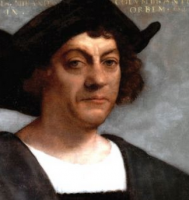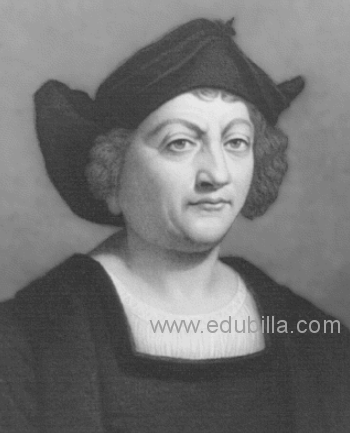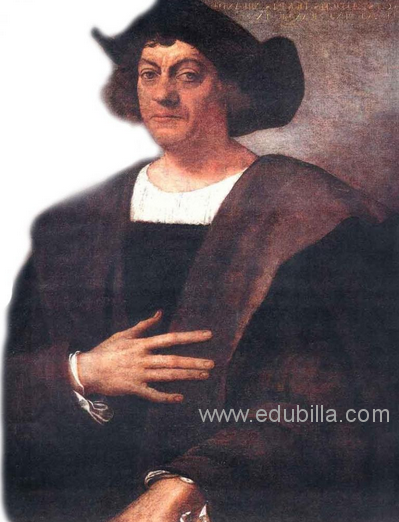










Christopher Columbus was an Italian explorer, navigator, and colonizer, citizen of the Republic of Genoa. Under the auspices of the Catholic Monarchs of Spain, he completed four voyages across the Atlantic Ocean. Those voyages, and his efforts to establish permanent settlements on the island of Hispaniola, initiated the Spanish colonization of the New World.
In the context of emerging western imperialism and economic competition between European kingdoms through the establishment of trade routes and colonies, Columbus' proposal to reach the East Indies by sailing westward, eventually received the support of the Spanish Crown, which saw in it a chance to enter the spice trade with Asia through a new westward route. During his first voyage in 1492, instead of reaching Japan as he had intended, Columbus landed in a New World, landing in the Bahamas archipelago, on an island he named San Salvador. Over the course of three more voyages, Columbus visited the Greater and Lesser Antilles, as well as the Caribbean coast of Venezuela and Central America, claiming them for the Spanish Empire.
Though Columbus was not the first European explorer to reach the Americas (having been preceded by the Norse expedition led by Leif Ericson in the 11th century), his voyages led to the first lasting European contact with the Americas, inaugurating a period of European exploration, conquest, and colonization that lasted for several centuries. They had, therefore, an enormous impact in the historical development of the modern Western world. Columbus himself saw his accomplishments primarily in the light of spreading the Christian religion.
Never admitting that he had reached a continent previously unknown to Europeans, rather than the East Indies he had set out for, Columbus called the inhabitants of the lands he visited indios (Spanish for "Indians").Columbus' strained relationship with the Spanish crown and its appointed colonial administrators in America led to his arrest and dismissal as governor of the settlements on the island of Hispaniola in 1500, and later to protracted litigation over the benefits which Columbus and his heirs claimed were owed to them by the crown.
Early life
The name Christopher Columbus is the Anglicisation of the Latin Christophorus Columbus. His name in Italian is Cristoforo Colombo, and in Spanish, it is Cristóbal Colón. Columbus was born before 31 October 1451 in the territory of the Republic of Genoa (now part of modern Italy), though the exact location remains disputed.His father was Domenico Colombo, a middle-class wool weaver who worked both in Genoa and Savona and who also owned a cheese stand at which young Christopher worked as a helper. Christopher's mother was Susanna Fontanarossa. Bartolomeo, Giovanni Pellegrino, and Giacomo were his brothers. Bartolomeo worked in a cartography workshop in Lisbon for at least part of his adulthood.He also had a sister named Bianchinetta.
Columbus never wrote in his native language, which is presumed to have been a Genoese variety of Ligurian (his name would translate in the 16th-century Genoese language as Christoffa Corombo pron.In one of his writings, Columbus claims to have gone to the sea at the age of 10. In 1470, the Columbus family moved to Savona, where Domenico took over a tavern. In the same year, Columbus was on a Genoese ship hired in the service of René I of Anjou to support his attempt to conquer the Kingdom of Naples. Some modern historians have argued that Columbus was not from Genoa, but instead, from the Aragon region of Spain or from Portugal.These competing hypotheses have generally been discounted by mainstream scholars.
In 1473, Columbus began his apprenticeship as business agent for the important Centurione, Di Negro and Spinola families of Genoa. Later, he allegedly made a trip to Chios, a Genoese colony in the Aegean Sea.In May 1476, he took part in an armed convoy sent by Genoa to carry a valuable cargo to northern Europe. He docked in Bristol, England and Galway, Ireland. In 1477, he was possibly in Iceland. In the autumn of 1477 Columbus sailed on a Portuguese ship from Galway to Lisbon, where he found his brother Bartolomeo, and they continued trading for the Centurione family. Columbus based himself in Lisbon from 1477 to 1485. He married Filipa Moniz Perestrelo, daughter of the Porto Santo governor and Portuguese nobleman of Lombard origin Bartolomeu Perestrello.
In 1479 or 1480, his son Diego Columbus was born. Between 1482 and 1485, Columbus traded along the coasts of West Africa, reaching the Portuguese trading post of Elmina at the Guinea coast.Some records report that Filipa died in 1485. It is also speculated that Columbus may have simply left his first wife. In either case, Columbus left Portugal for Castile in 1485, where he found a mistress in 1487, a 20-year-old orphan named Beatriz Enríquez de Arana.
Ambitious, Columbus eventually learned Latin, Portuguese, and Castilian, and read widely about astronomy, geography, and history, including the works of Claudius Ptolemy, Cardinal Pierre d'Ailly's Imago Mundi, the travels of Marco Polo and Sir John Mandeville, Pliny's Natural History, and Pope Pius II's Historia Rerum Ubique Gestarum. According to historian Edmund Morgan,
Columbus was not a scholarly man. Yet he studied these books, made hundreds of marginal notations in them and came out with ideas about the world that were characteristically simple and strong and sometimes wrong, the kind of ideas that the self-educated person gains from independent reading and clings to in defiance of what anyone else tries to tell him.
Throughout his life, Columbus also showed a keen interest in the Bible and in Biblical prophecies, and would often quote biblical texts in his letters and logs. For example, part of the argument that he submitted to the Spanish Catholic Monarchs when he sought their support for his proposed expedition to reach the Indies by sailing west was based on his reading of the Second Book of Esdras.Towards the end of his life, Columbus produced a Book of Prophecies, in which his career as an explorer is interpreted in the light of Christian eschatology and of apocalypticism.

